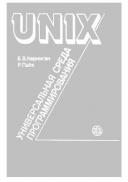Книга: UNIX — универсальная среда программирования
3.2.1 hoc.y
3.2.1 hoc.y
%{
double mem[26]; /* memory for variables 'a'..'z' */
%}
%union { /* stack type */
double val; /* actual value */
int index; /* index into mem[] */
}
%token <val> NUMBER
%token <index> VAR
%type <val> expr
%right '='
%left '+' '-'
%left '*' '/'
%left UNARYMINUS
%%
list: /* nothing */
| list 'n'
| list expr 'n' { printf("t%.8gn $2); }
| list error 'n' { yyerrok; }
;
expr: NUMBER
| VAR { $$ = mem[$1]; }
| VAR '=' expr { $$ = mem[$1] = $3; }
| expr '+' expr { $$ = $1 + $3; }
| expr '-' expr { $$ = $1 - $3; }
| expr '*' expr { $$ = $1 * $3; }
| expr '/' expr {
if ($3 == 0.0)
execerror("division by zero", "");
$$ = $1 / $3;
}
| '(' expr ')' { $$ = $2; }
| '-' expr %prec UNARYMINUS { $$ = -$2; }
;
%%
/* end of grammar */
#include <stdio.h>
#include <ctype.h>
char *progname;
int lineno = 1;
#include <signal.h>
#include <setjmp.h>
jmp_buf begin;
main(argc, argv) /* hoc2 */
char *argv[];
{
int fpecatch();
progname = argv[0];
setjmp(begin);
signal(SIGFPE, fpecatch);
yyparse();
}
yylex() /* hoc2 */
{
int c;
while ((c=getchar()) == ' ' || c == 't')
;
if (c == EOF)
return 0;
if (c == '.' || isdigit(c)) { /* number */
ungetc(c, stdin);
scanf("%lf", &yylval.val);
return NUMBER;
}
if (islower(c)) {
yylval.index = c - 'a'; /* ASCII only */
return VAR;
}
if (c == 'n')
lineno++;
return c;
}
yyerror(s) /* report compile-time error */
char *s;
{
warning(s, (char*)0);
}
execerror(s, t) /* recover from run-time error */
char *s, *t;
{
warning(s, t);
longjmp(begin, 0);
}
fpecatch() /* catch floating point exceptions */
{
execerror("floating point exception", (char*)0);
}
warning(s, t) /* print warning message */
char *s, *t;
{
fprintf(stderr. "%s: %s", progname, s);
if (t && *t)
fprintf(stderr, " %s , t);
fprintf(stderr, " near line %dn", lineno);
}




